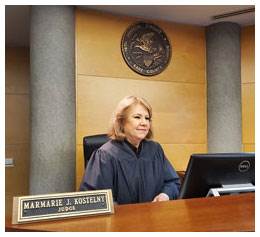April 28, 2020
 For the first time in the history of Kane County, the Treatment Alternative Court (TAC) held a remote graduation ceremony on April 23, 2020. Although Kane County Courts have limited in court hearings to emergency and necessary matters during this coronavirus pandemic, two participants in this specialty court program participated in a historic graduation using the Zoom video conferencing tool. Judge Marmarie J. Kostelny presided.
For the first time in the history of Kane County, the Treatment Alternative Court (TAC) held a remote graduation ceremony on April 23, 2020. Although Kane County Courts have limited in court hearings to emergency and necessary matters during this coronavirus pandemic, two participants in this specialty court program participated in a historic graduation using the Zoom video conferencing tool. Judge Marmarie J. Kostelny presided.
“These two participants were originally scheduled to graduate from the program on March 26,” Kostelny said. “As a result of the pandemic, we were unable to go forward at that time. However, both participants expressed a willingness to explore a different type of graduation. “
Chief Judge Clint Hull authorized the use of video conferencing for regular status hearings for the Specialty Courts at the end of March and all three Specialty Courts (Drug Rehabilitation Court, Veterans Treatment Court and Treatment Alternative Court) have been conducting regular court calls since the first week of April.
“Graduations in TAC provide a special recognition of the accomplishments and achievements of the successful participants,” Kostelny added. “As a team, we try to make them very special occasions allowing many to join in the congratulations.” Kostelny noted that Chief Judge Hull was present in the Zoom conference to congratulate the graduates as were family, friends, and treatment professionals from the Kane County Diagnostic Center, Ecker Center and Association for Individual Development.
Treatment Alternative Court is a Kane County Specialty Court program established in 2006 to serve defendants who have serious mental health conditions, co-occurring disorders, or developmental disabilities. The TAC team works with participants to establish appropriate psychiatric and therapeutic care to reduce symptoms and reduce new arrests.
The graduation marked the completion of an intensive program requiring substantial accountability and sustained treatment. Participants in TAC are required to appear frequently in court, maintain compliance with any prescribed medications and treatment, meet regularly with probation and maintain sobriety. For these two graduates, successful completion of the program resulted in the criminal charges being dismissed.